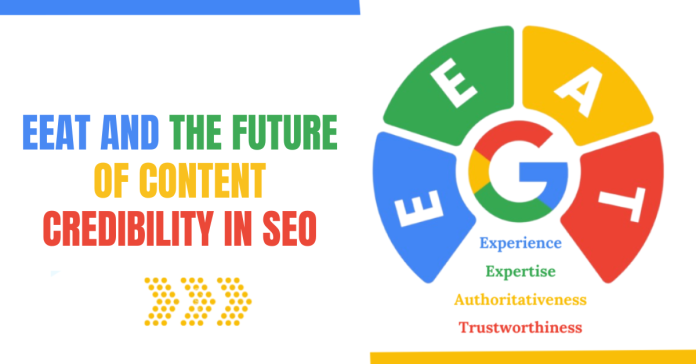In a digital world overflowing with content, standing out isn’t just about being louder—it’s about being credible. For search engines and users alike, trust has become the new currency of the internet. That’s where EEAT comes into play.
EEAT stands for Experience, Expertise, Authoritativeness, and Trustworthiness—four pillars that now significantly influence how Google evaluates the quality of content and, in turn, ranks it. As the web continues to evolve, EEAT is no longer a suggestion. It’s fast becoming the foundation of sustainable SEO success.
So, what does EEAT mean for your content? And how can businesses adapt their SEO strategies to prioritize credibility over clicks? Let’s dive in.
The Shift: From Keywords to Credibility
For years, SEO was dominated by keywords. If you could find the right ones and sprinkle them strategically, chances were your content would perform well. But with time—and billions of pages added every year—Google had to get smarter.
It’s not enough to simply say the right things; now, you have to prove you know what you’re talking about. That’s where EEAT enters the picture.
EEAT isn’t a direct ranking factor in the way that backlinks or page speed are, but it’s a guiding framework used by Google’s human quality raters to evaluate content. More importantly, it’s shaping the algorithm to favor pages that are truly helpful, reliable, and created by knowledgeable sources.
Breaking Down EEAT
1. Experience
This is about first-hand knowledge. Have you actually used the product, tested the service, or been in the situation you’re writing about? In a world full of AI-generated content, experience brings an authentic, human perspective that sets your content apart.
2. Expertise
Here, the focus is on your qualifications. Are you or the author of your content truly an expert in the subject matter? This is especially important for topics in finance, health, and legal sectors—areas where incorrect information could have real-world consequences.
3. Authoritativeness
This relates to your reputation. Do other trusted websites reference your work? Are you seen as a go-to source within your industry? Authority is often built over time through citations, high-quality backlinks, and meaningful contributions to your field.
4. Trustworthiness
This is the glue that holds the rest together. A site can be experienced, expert, and authoritative—but if it’s not secure, transparent, or honest, users and search engines won’t trust it. Think clear privacy policies, accurate contact info, and honest, non-sensational content.
Why EEAT Is Crucial for the Future of SEO
The explosion of AI-generated content has raised important questions about content quality. With so much information available at our fingertips, Google is under pressure to ensure that what it shows in search results is accurate, helpful, and trustworthy.
This means that search algorithms are leaning more and more into signals that reflect EEAT values.
So, whether you’re a blogger, a startup, or an established SEO company in Sharjah, investing in content credibility is no longer optional—it’s essential for ranking well and building lasting relationships with your audience.
Building EEAT Into Your Content Strategy
Ready to align your strategy with EEAT principles? Here’s how to start:
1. Feature Real Authors with Credentials
Don’t publish anonymously. Include author bios that explain their background, experience, and why they’re qualified to write on the topic. Link to their professional profiles if possible.
2. Incorporate First-Hand Experience
Whether it’s a product review or a how-to guide, include real insights, photos, results, and observations. Show readers you’ve been there, done that.
3. Use Reliable, Cited Sources
Support your claims with external references from reputable sources. This not only enhances trust but shows you’ve done your homework.
4. Maintain Transparency
Your site should clearly indicate who’s behind it. Include an “About Us” page, visible contact details, privacy policies, and terms of use. It may seem basic, but it’s a powerful trust signal.
5. Build Your Authority Over Time
Write guest posts, participate in podcasts, and collaborate with influencers in your space. Authority is built by consistent contributions to your niche—both on your site and across the web.
The Human Element of EEAT
It’s easy to think of SEO as a technical process, but EEAT is a reminder that people are at the center of every search. Every Google update in recent years has emphasized that point: put the user first.
That means content should:
- Answer real questions
- Reflect real experiences
- Offer real solutions
While an algorithm might decide where your content ranks, a human decides if it’s worth reading. And when they feel informed, respected, and understood, they’re far more likely to engage, convert, and come back for more.
SEO Is Maturing, and So Should Your Strategy
As the SEO world continues to mature, the days of tricking the algorithm are behind us. What’s emerging is a more human-centered approach—one where credibility, value, and trust take center stage.
The businesses that succeed in this new era won’t be the ones who publish the most content—they’ll be the ones who publish the most credible content.
Whether you’re managing a blog or working with an experienced SEO company in Abu Dhabi, prioritizing EEAT will help your content rise above the noise and stay relevant in the long run.
The future of SEO isn’t just technical—it’s deeply human.








